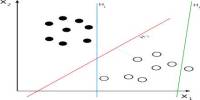Reliability in Statistics is frequently used in research contexts, in everyday use, the word “reliable” means dependable, consistent or unfailing. It is the characteristic of a set of test scores that relates to the amount of random error from the measurement process that might be embedded in the scores. It have been developed to estimate the effects of inconsistency on the accuracy of measurement. This theory shows that the variance of obtained scores is simply the sum of the variance of true scores plus the variance of errors of measurement. It is to determine how much of the variability in test scores is due to errors in measurement and how much is due to variability in true scores.
Reliability in Statistics
















